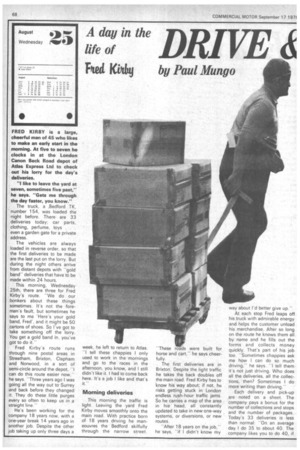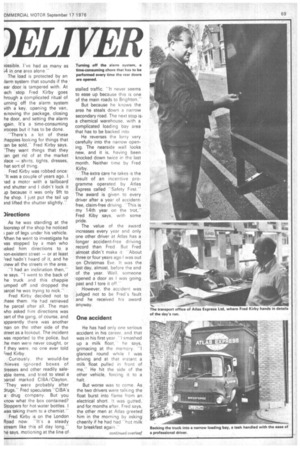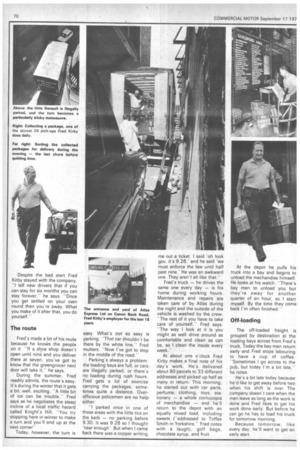life of
Page 70

Page 71

Page 72

If you've noticed an error in this article please click here to report it so we can fix it.
A daY the DRIVE A ELIV
Rea Wig
by Paul Mungo
FRED KIRBY is a large, cheerful man of 45 who likes to make an early start in the morning. At five to seven he clocks in at the London Canon Beck Road depot of Atlas Express Ltd to check out his lorry for the day's deliveries.
"I like to leave the yard at seven, sometimes five past," he says. "Gets me through the day faster, you know."
The truck, a ,Bedford TK, number 154, was loaded the night before. There are 33 deliveries today; car parts, clothing, perfume, toys . . even a garden gate for a private address.
The vehicles are always loaded in reverse order, so that the first deliveries to be made are the last put on the lorry. But during the night others arrive from distant depots with "gold band" deliveries that have to be made within 24 hours.
This morning, Wednesday 25th, there are three for Fred Kirby's route. "We do our honkers about these things sometimes. It's not the foreman's fault, but sometimes he says to me 'Here's your gold band, Fred', and it might be 50 .cartons of shoes. So I've got to take something off the lorry. You get a gold band in, you've got to do it."
Fred Kirby's route runs through nine postal areas in Streatham, Brixton, Clapham and Norwood, in a sort of semi-circle around the depot. "I can do this route easier now," he says. "Three years ago I was going all the way out to Surrey and back before they changed it. They do these little purges every so often to keep us in a straight line."
He's been working for the company 18 years now, with a one-year break 14 years ago in another job. Despite the other job taking up only three days a week, he left to return to Atlas. "I tell these chappies I only used to work in the mornings and go to the races in the afternoon, you know, and I still didn't like it I had to come back here. It's a job I like and that's it
Morning deliveries This morning the traffic is light. Leaving the yard .Fred Kirby moves smoothly onto the main road. With practice horn of 18 years driving he maneouvres the Bedford skilfully through the narrow street.
"These roads were built for horse and cart," he says cheerfully.
The first deliveries are in Brixton. Despite the light traffic he takes the back doubles off the main road. Fred Kirby has to know his way about; if not, he risks getting stuck in London endless rush-hour traffic jams. So he carries a map of the area in his head, all constantly updated to take in new one-way systems, or diversions, or new routes.
"After 18 years on the job," he says, "if I didn't know my way about I'd better give up.
At each stop Fred leaps off his truck with admirable energy. and helps the customer unload his merchandise. After so long on the route he knows them all by name and he fills out the forms and collects money quickly. That's part of his job too. "Sometimes chappies ask me how I can do so much driving,'" he says. "I tell them it's not just driving. Who does all the deliveries, all the collections, then? Sometimes I do more writing than driving."
Each delivery and pick-up are noted on a sheet. The company pays a bonus for the number of collections and stops and the number of packages. Today's 33 deliveries is less than normal: "On an average day I do 35 to about 40. The company likes you to do 40, if )ossible. I've had as many as i4 in one area alone."
The load is protected by an larm system that sounds if the ear door is tampered with. At
iach stop Fred Kirby goes hrough a Complicated ritual of urningoff the alarm system with a key, opening the van, einoving the package, closing he door, and setting the alarm 'gain. It's a time-consuming gocess but it has to be done.
"There's a lot of these ;happies looking for things that an be sold," Fred Kirby says. 'They want things that they an get rid of at the market )lace — shirts, tights, dresses, hat sort of thing.
Fred Kirby was robbed once: 'It was a couple of years ago.
lad a motor with a tailboard md shutter and I didn't lock it ip because it was only 9ft to he shop. I just put the tail up Ind lifted the shutter slightly.''
)irections As he was standing at the loorstep of the shop he noticed pair of legs under his vehicle. 'nen he went to investigate he was stopped by a man who isked him directions to a ion-existent street — or at least 'red hadn't heard of it, and he ;new all the streets in the area. "I had an inclination then," le says. -I went to the back of he truck and this chappie umped off and dropped the )arcel he was trying to nick.Fred Kirby decided not . to ;hese them. He had retrieved he parcel after all. The man nth° asked him directions was )art of the gang, of course, and )pparently there was another nan on the other side of the treet as a lookout. The incident as reported to the police, but he men were never cought, or f they were, no one ever told 'red Kirby.
Curiously, the would-be :hieves ignored boxes of lresses and other readily salesbie items, and tried to steal a parcel marked CIBA /Clayton. 'They were probably after Jrugs,'' Fred speculates "CIBA's a drug company. But you now what the box contained? Stoppers for hot water bottles. I as taking them to a chemist." Fred Kirby is on the London Road now. -It's a steady stream like this all day long," he says, motioning at the line of stalled traffic. "It never seems to ease up because this is one of the main roads to Brighton.
But because he knows the area he steals down a narrow secondary road. The next stop is, a chemical warehouse, with a complicated loading bay area that has to be backed into.
He reverses the lorry very carefully into the narrow opening. The nearside wall looks new, and it is, having been knocked down twice in the last month. Neither time by Fred Kirby.
The extra care he takes is the result of an incentive programme operated by Atlas Express called ''Safety First." The award is given to every driver after a year of accidentfree, claim-free driving. "'This is . my 14th year on the trot,Fred Kiby says, with some pride.
The value of the award increases • every year and only one other driver at Atlas has a ['anger accident-free driving record than Fred. But Fred almost didn't make it: "About three or four years ago I was out on Christmas Eve It was the last day, almost, before the end of the year. Well, someone opened a door as I was going past and I tore it off'' However, the accident was . judged not to be Fred's fault and he received his award anyway.
One accident
He has had only one serious accident in his career, and that was in his first year "I smashed up a milk float," he says, grimacing at the memory. "I glanced round while I was driving and at that instant a milk float pulled in front of me," He hit the side of the other vehicle, forcing it to a halt.
But worse was to come. As the two drivers were talking the float burst into flame from an. electrical short. It was gutted, and for months after. Fred says, the other men at Atlas greeted him in the morning by asking cheerily if he had had ' hot milk
for breakfast again." Backing the truck into a narrow loading bay, a task handled with the ease of
Despite the bad start Fred Kirby stayed with the company. "I tell new drivers that if you can stay for six months you can stay forever," he says. "Once you get settled on your own round then you're away. What you make of it after that, you do yourself."
The route
Fred's made a lot of his route because he knovirs the people on it. "If a shoe shop doesn't open until nine and you deliver there at seven, you've got to know that the greengrocer next door will take it," he says.
During the summer, Fred readily admits, the route's easy. It's during the winter that it gets a bit, well, exciting. "A little bit of ice can be trouble," Fred says as he negotiates the steep incline of a local traffic hazard called Knight's Hill. ''You try stopping here in winter to make a turn and you'll end up at the next corner'' Today, however, the turn is easy. What's not so easy is parking. "That car shouldn't be there by the white line," Fred mutters. "Now I've got to stop in the middle of the road."
Parking's always a problem: the loading bays are full, or cars are illegally parked, or there's no loading during rush hours. Fred gets a lot of exercise carrying the packages, sometimes quite a distance. Overofficious policemen are no help either: "I parked once in one of those areas with the little tics on the kerb — no parking before 9.30. It was 9.28 so I thought 'near enough'. But when I came back there was a copper writing me out a ticket. I said 'oh look gov, it's 9.28; and he said 'we must enforce the law until half past nine.' He was an awkward one. They aren't all like that."
Fred's truck — he drives the same one every day — is his home during working hours. Maintenance and repairs are taken care of by Atlas during the night and the outside of the vehicle is washed by the crew. "The rest of it you have to take care of yourself," Fred says. "The way I look at it is you might as well drive around as comfortable and clean as can be, so I clean the inside every week."
At about one o'clock Fred Kirby makes a final note of his day's work. He's delivered about 90 parcels to 33 different addresses and picked up half as many in return. This morning, he started out with car parts, perfume, clothing, toys, sta tionery a whole cornucopia of merchandise — and he'll return to the depot with an equally mixed load, including sweets ("addressed to Toffee Smith in Yorkshire," Fred notes with a laugh), golf bags, chocolate syrup, and fruit At the depot he pulls his truck into a bay and begins to unload the mechandise himself. He looks at his watch. "There's bay men to unload you but they're away for another quarter of an hour, so I start myself. By the time they come back I'm often finished."
Off-loading
The off-loaded freight is grouped by destination at the loading bays across from Fred's truck. Today the bay men return early and Fred stops labouring to have a cup of coffee. "Sometimes I go across to the pub, but today I'm a bit late," he notes.
He's a bit late today because he'd like to get away before two when his shift is over The company doesn't care when the men leave as long as the work is done and Fred likes to get his work done early: But before he can go he has to load his truck for tomorrow morning.
Because tomorrow, like every day, he'll want to get an early start.








































































































































































































